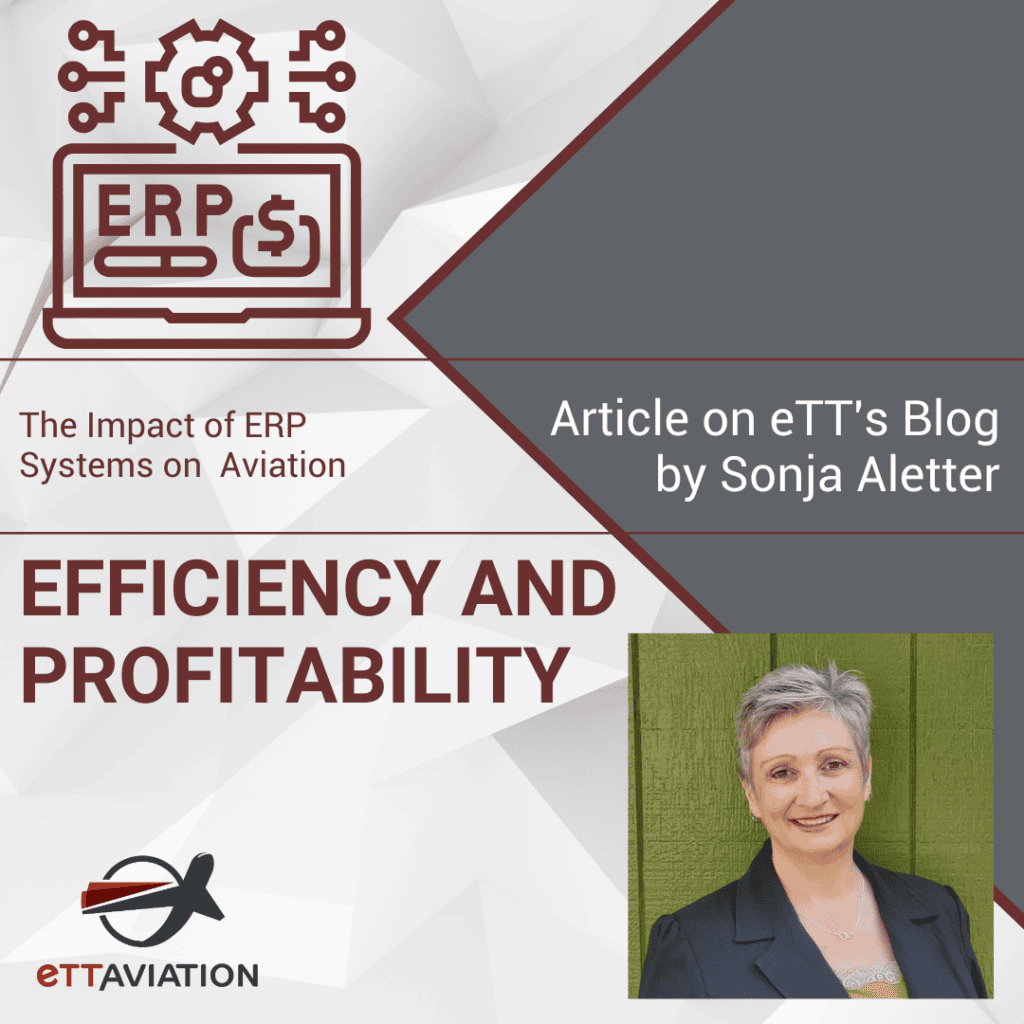By Sonja Aletter, Chief Operating Officer, eTT Aviation
In the ever-evolving landscape of the aviation industry, operational efficiency and profitability stand as towering pillars of success. As airlines and aviation-related businesses strive to soar above challenges, the adoption of advanced Enterprise Resource Planning (ERP) systems emerges as a transformative force. These systems are not merely tools but catalysts that redefine the dynamics of aviation operations.

Unlocking New Horizons of Efficiency
At the heart of aviation operations lies the unyielding quest for efficiency. An ERP system integrates various facets of operations, from maintenance, inventory, and finance to human resources and flight operations, into a cohesive, streamlined platform. This integration eliminates silos, fosters communication, and enables data-driven decisions.
Imagine the seamless orchestration of flight schedules, crew management, and aircraft maintenance — all aligned to minimize downtime and optimize resource utilization. The direct impact? Enhanced operational efficiency that propels airlines towards higher productivity and service excellence.
Navigating the Financial Skies with Precision
Profitability in aviation is closely tied to how effectively an organization manages its finances. ERP systems shine a spotlight on financial transparency and control, providing real-time insights into costs, revenues, and profitability. With features like aviation financial management, cost index flight planning, and budget forecasting, ERP systems empower aviation businesses to navigate the financial skies with unprecedented precision.
The ability to track every dollar, understand cost drivers, and identify financial leaks can transform an airline’s financial health, turning potential losses into opportunities for profit.
Fueling Innovation with Data
In today’s data-driven era, information is the lifeblood of innovation. ERP systems serve as repositories of vast amounts of data, offering invaluable insights into every aspect of aviation operations. From optimizing flight routes for fuel efficiency with airline operations software to predicting maintenance needs with aviation maintenance tracking software, the data harnessed by ERP systems fuels innovation and continuous improvement.
Moreover, with the advent of aviation data analytics, businesses can anticipate market trends, customer preferences, and operational challenges, staying one step ahead in a competitive landscape.
Enhancing Customer Satisfaction
Customer satisfaction is the runway to aviation success. ERP systems contribute significantly to this aspect by ensuring that operations run smoothly and efficiently, directly enhancing the passenger experience. From on-time departures and arrivals to swift customer service and personalized offerings, the ripple effect of operational efficiency on customer satisfaction is profound.
Moreover, ERP systems enable airlines to manage loyalty programs, track customer feedback, and tailor services to meet evolving expectations, thereby elevating the customer experience to new heights.
Streamlining Regulatory Compliance
The aviation industry is tightly regulated, and compliance with myriad regulations is non-negotiable. ERP systems streamline compliance by maintaining detailed records, automating reporting processes, and ensuring that all operations are aligned with regulatory standards. This not only mitigates the risk of non-compliance and associated penalties but also reinforces an airline’s reputation for safety and reliability.
The Road Ahead
The impact of ERP systems on aviation efficiency and profitability is undeniable. As the Chief Operating Officer of eTT Aviation, I have witnessed firsthand the transformative power of integrating comprehensive ERP solutions into our operations. The journey towards operational excellence and financial prosperity in aviation is complex, but with the right ERP system, it becomes a voyage of discovery, innovation, and unparalleled success.
As we look towards the horizon, the role of ERP systems in shaping the future of aviation remains central. Their ability to adapt, evolve, and unlock new levels of efficiency and profitability will continue to be a game-changer for airlines and aviation businesses worldwide.
In conclusion, the fusion of ERP systems into aviation operations is not just an operational necessity but a strategic imperative. In the quest for efficiency and profitability, these systems are the co-pilots that every aviation business needs to navigate the challenging skies of the industry.